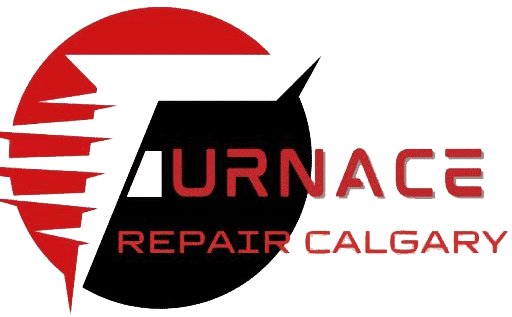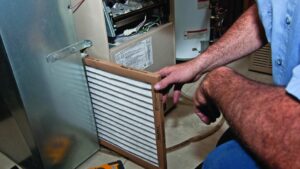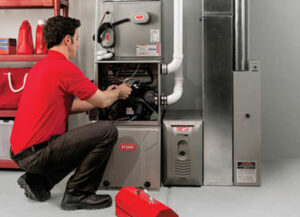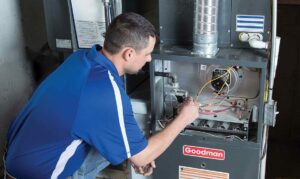What to Do When Furnace Smells Like Burning?
As winter approaches, many rely more heavily on our furnaces and fireplaces to keep them warm. While these heating systems can be an excellent source of comfort during the colder months, they can quickly become problematic if you start detecting strange smells like burning coming from your furnace, which is why it’s so important to know what to do when this happens.
If your furnace smells like it’s burning something, continue reading for helpful guidance that will help you diagnose the issue to avoid significant damage or repair bills in the future!
Step 1: Turn off Your Furnace
If you notice a burning smell coming from your furnace, you should first turn it off. It is crucial for several reasons. First, it helps prevent any potential fire hazards. If there is an electric short or gas leak, continuing to run your furnace could worsen the situation. Turning off the furnace can protect you and your home from further damage or danger.
Another reason to turn off the furnace is to allow it to cool down. If you notice a burning smell, your furnace is likely overheating. Continuing to run it in this state could cause serious problems or even permanent damage. Allowing it to cool down can help prevent this.
Turning off the furnace can also give you time to assess the situation and determine the cause of the problem.
Step 2: Identify the Smell
The type of smell you’re experiencing can give clues as to what is causing the burning smell in your home. Here are some common types of smells and what they might mean:
Burning plastic: If you smell burning plastic, there may be something burning inside your furnace that shouldn’t be there.
Metallic burning smell: This smell might indicate that something metal, such as a wire, is overheating.
Burning oil: If your furnace smells like burning oil, it could mean an issue with your oil-based heating system.
Electrical burning smell: This could mean a problem with your furnace’s electrical components, such as wires or circuit boards.
Rotten egg smell: This smell is associated with gas leaks and should be taken seriously. If you smell this, turn off your furnace immediately and evacuate your home before calling a professional.
Step 3: Check Your Air Filters
Air filters are essential components in your furnace. They help clean the air circulating in your home and prevent dirt, dust, and debris from entering your furnace. However, these air filters can become clogged with dust and debris over time, reducing their efficiency and causing your furnace to overheat.
Checking and changing your air filters is essential to regular furnace maintenance. Clean air filters can help your furnace run more efficiently and reduce the risk of overheating, which can cause permanent damage to your furnace and a possible fire hazard.
Here’s what to do:
- Check the air filters in your furnace. If they are dirty or clogged, replace them with clean ones.
- Make sure nothing is blocking the vents or obstructing airflow to the furnace.
- Clear any debris from the area around your furnace to help improve air circulation.
Step 4: Inspect Your Furnace
If your furnace continues to produce a burning smell despite changing your air filters, it’s time to inspect the furnace itself.
Inspecting your furnace is essential in determining the root cause of the burning smell. There are several signs of damage you should look out for when inspecting your furnace. These include:
Burnt wires: Burnt or frayed wires can cause overheating and a burning smell.
Cracked heat exchanger: A crack in your furnace’s heat exchanger could cause air from the furnace to mix with dangerous gases.
Blower motor issues: Issues with the blower motor could cause poor airflow or even prevent it from working altogether.
Clogged burner: A clogged burner can cause overheating and produce a burning smell.
Step 5: Call a Professional
While some issues with your furnace can be fixed through basic maintenance or do-it-yourself repairs, others require the expertise of a professional HVAC technician. Here are some indicators that it’s time to call in an experienced HVAC technician:
- If you’re not sure what the root cause of the problem is, or you can’t identify it yourself.
- If you’ve gone through the previous steps, but the burning smell from your furnace persists.
- If you’re not confident in making repairs yourself.
- If you’re experiencing other furnace-related problems, such as strange noises, insufficient heat, or high energy bills.
Hiring a qualified HVAC technician is essential for several reasons. First, they have the knowledge and experience to accurately diagnose and repair furnace problems, reducing the risk of further damage to your furnace or home. They also know how to handle any safety risks associated with the situation.
Second, a professional technician can regularly maintain your furnace, including cleaning, inspection, and tune-ups. It can save you money in the long run by preventing expensive repairs and prolonging the lifespan of your furnace.
Conclusion
If your furnace is producing a burning smell, it’s essential to take action and investigate the root cause of the problem. Start by checking your air filters and ensuring nothing is blocking the vents. If this doesn’t solve the issue, inspect your furnace for signs of damage, such as burnt wires or cracked heat exchangers. If you can’t find the source of the problem yourself, hire an experienced HVAC technician to diagnose and repair it safely and efficiently.
Regular maintenance will help keep your furnace running smoothly and reduce the risk of future problems. Remember: never ignore a burning smell from your furnace! It could be indicative of a severe problem that requires professional attention. Taking action now could save you time, money, and even your safety in the long run.






